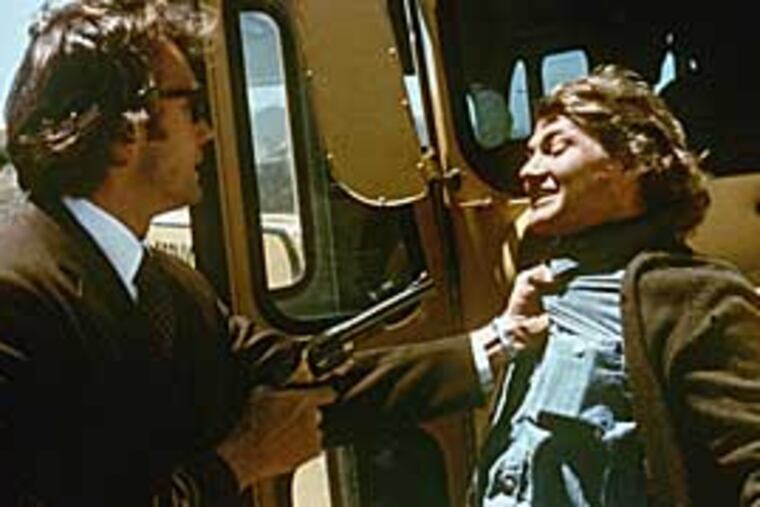Dirty Harry left smudge on film and society too
For good or for ill, Clint Eastwood's five Dirty Harry films, which have been released in a new seven-disc DVD boxed set by Warner Home Video ($74.98), have done more to define today's cop movie than virtually any other film.

For good or for ill, Clint Eastwood's five Dirty Harry
films, which have been released in a new seven-disc DVD boxed set by Warner Home Video ($74.98), have done more to define today's cop movie than virtually any other film.
From where else could the requirement come that every new action flick coin a catchphrase than from the films that gave us half a dozen memorable one-liners, most notably Inspector Harry Callahan's self-satisfied, I'm-this-close-to-dispatching-your-soul-to-hell proclamation, "Go ahead, make my day."
From Arnold Schwarzenegger's "I'll be back" in the first two Terminator films to Bruce Willis' "Yippee-kai-yay" in Die Hard, the catchphrase usually validates the hero's moral - and mortal - superiority and helps fuse our enthusiastic identification with him.
Trouble is, more often than not, the one-liner is uttered just as the hero is about to unleash a big can of vengeful, homicidal whoop on the bad guy.
This is the most significant - and controversial - thematic element Dirty Harry has bequeathed the contemporary cop drama: Harry is as much vigilante as he is Joe Friday. He doesn't bother with such niceties as Miranda rights. Thus the violent reactions the original 1971 film inspired in many critics, including Pauline Kael, who called it "fascist."
The Dirty Harry films seem to argue that a new type of cop, a vigilante cop, is what America needs to deal with a terrifying new type of bad guy, the serial killer, who was relatively new to American film when Dirty Harry was released.
Set in San Francisco and based in part on the Zodiac killer, Dirty Harry has as its villain a serial killer named Scorpio who looks a little too much like a hippie: He has long hair and wears a warped peace sign on his belt.
The anti-hippie attitude isn't an accident: Dirty Harry was shot in the spring and summer of 1971, during the waning days of the hippie movement. Just a year earlier, Charles Manson and his followers were on trial for the Sharon Tate murders.
The film opens with a list of San Francisco police officers shot in the line of duty and speaks to a generation as interested in victims' rights as the '60s generation had been in ensuring the rights of the accused.
In the film's most telling scene, the district attorney berates Harry for torturing Scorpio. (Harry was trying to learn the location of a 14-year-old girl Scorpio had buried alive.)
"The law is crazy," Harry says when reminded of the Miranda ruling. "I don't know what the law says, but I do know what's right and wrong."
Harry believes he answers to a higher principle. But for all his anti-establishment cant, he is still a tool of the establishment, and he knows it. His entire being is devoted to his calling.
Harry's story is one of personal defeat and loss. He has no friends, no wife, no family and no hobbies or interests other than cleaning his .44 Magnum pistol. This seems to be the price he pays for being a Scourge for Justice: His is a hollow life.
Hollow or not, Harry has given birth to virtually every hero-as-vigilante in contemporary American thrillers. With one difference: The new films no longer shock critics or viewers. No one thinks of them as "fascistic."
Take Bruce Willis' Die Hard character, John McClane, a vengeful angel who (conveniently) is always forced by circumstances to blow away the bad guy rather than book him.
This is a commonplace in contemporary thrillers. You don't have to watch the 78th sequel to Death Wish to get the message that it's oh, so good to kill the bad guy.
Like Die Hard, they so personalize the hero's mission that revenge and justice become interchangeable. Other examples include the comic-book adaptation The Punisher, about an FBI agent whose family is wiped out by the mob. The Punisher, as his nickname suggests, doesn't bust the gunmen and their boss, but systematically wipes them out.
It's the same in political thrillers: The Shooter stars Mark Wahlberg as a crack sniper who is set up for the attempted assassination of the president. Once he uncovers the plot, he eliminates the bad guys with extreme prejudice. Or see the brilliant TV show 24: Do we ever get upset when federal agent Jack Bauer (Kiefer Sutherland) tortures or kills a suspect?
Oughtn't we be upset?
'Dirty Harry' Ultimate Collector's Edition
Seven-disc boxed set from Warner Home Video features all five Dirty Harry films (Dirty Harry; Magnum Force; The Enforcer; Sudden Impact; Dead Pool), plus hours of added material; $74.98. Each film is also available separately: $29.98 for the two-disc Dirty Harry; $14.98 for each of the other four films.
EndText